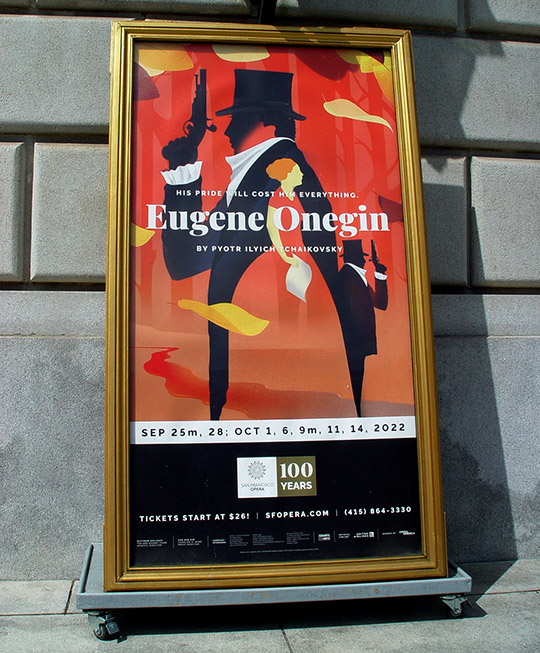The San Francisco War Memorial Opera House has been my clubhouse, college, church, and dream palace for over 50 years, and the San Francisco Opera is having its 100th anniversary this year. In other words, over half the life of this cultural institution has been entwined with mine, from standing room in my teens to subscriber to onstage supernumerary to a writer about the company.
I still love standing room in the top balcony where the sound from the huge stage blends as it rises, hits the top back wall, and reverberates through more parts of your body than just your ears. After being shut down by the pandemic, standing room is back, and it's still a miraculous $10. You can buy a ticket from the box office on the day of a performance and join the Children of Paradise. Also, if you're new to the San Francisco Opera and haven't been to the War Memorial in three years, the Dolby Corporation is subsidizing two good, expensive seats for $10 as a centennial promotion. Click here to sign up for Dolby's Opera on the Bay. So what should you see?
The opening opera is Antony and Cleopatra, a world premiere commission from Berkeley composer John Adams, based on the Shakespeare tragedy. It's a big frigging deal, and whether or not it's successful or a disaster or both, it will be an event that will be talked about for as long as we're alive, so you should go if you have any sense of adventure.
This will be the first opera Adams (pictured above at the SF Symphony) has written without the director/librettist Peter Sellars as collaborator, and it will be his first attempt at setting Shakespearean verse. I recently read the play for the first time and it's long (40+ scenes in 5 acts), weird, discursive, with oddly unlikable characters, but it has moments of true grandeur, and I can hardly wait to see what they do with the play and the English poetry.
Tchaikovsky's Eugene Onegin is up next, and it's almost a perfect opera. As a young musical snob, I looked down on Tchaikovsky's music until discovering the two operas he wrote on Pushkin works, The Queen of Spades and Eugene Onegin, and had to reassess a few ignorant prejudices. San Francisco is restaging the Robert Carsen production that was created for The Met in 1997. It was controversially stark at its premiere, but by all accounts has aged well.
Poulenc's Dialogues of the Carmelites is a Catholic martryrdom opera about 16 Carmelite nuns who were executed during the Terror of the French Revolution. Premiered at La Scala in 1957 and the San Francisco Opera later the same year, most of the opera takes place in a convent and includes a great deathbed scene for an old soprano who has lost her faith at the worst possible time and an outrageous finale where the sisters sing Salve Regina while getting their heads lopped off one by one. The music is one of my favorite 20th century opera scores, strange and seductive and, yes, spiritual.
The final two operas this fall are a brand new production of Verdi's perennial favorite, La Traviata, and the rarely performed 1762 Orfeo ed Euridice by Christof von Gluck. They are being promoted as important debuts of two young stars, soprano Pretty Yende in La Traviata and countertenor Jakub Józef Orliński as Orfeo. Neither of them excite me on paper as much as the previous three, but one of the joys of any opera season are the happy surprises. Hope to see you this fall at the War Memorial.








No comments:
Post a Comment